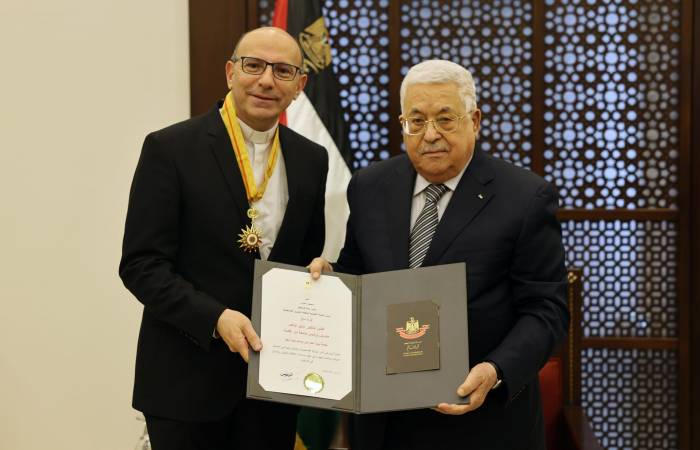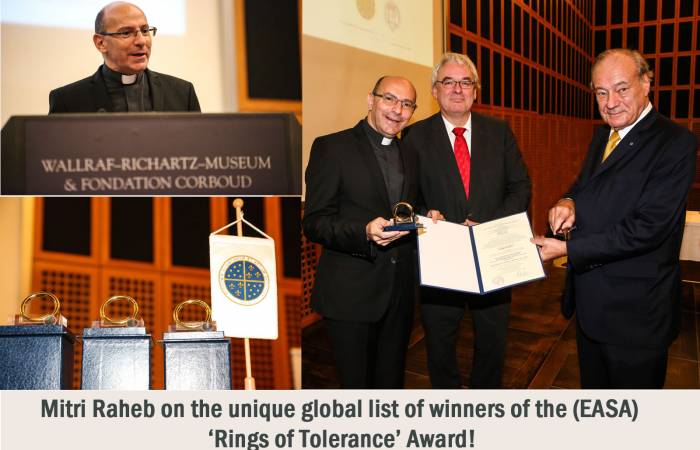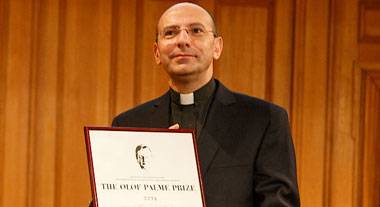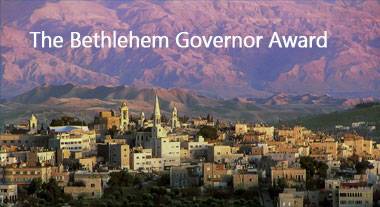"Deutscher Medienpreis" (German Media Award)
Deutscher Medienpreis (German Media Award) “ for the tireless work in creating room for hope for people living under Israeli Occupation, through founding and building institutions of excellence in education, culture and health.
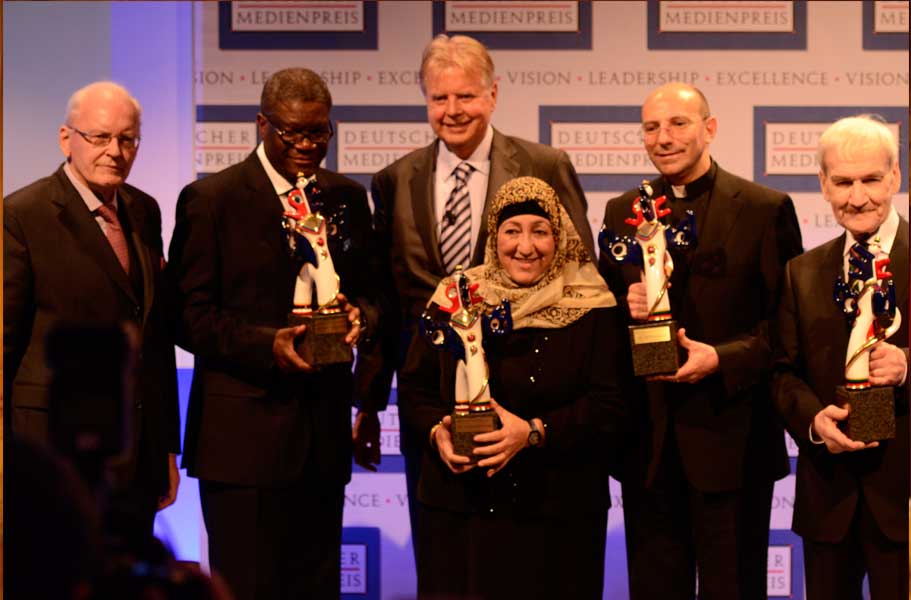
German Media Prize
Speech by Rev. Dr. Mitri Raheb
Baden-Baden, February 24th 2012
Your Excellency, President Professor Herzog,
Dear Mr. Koegel,
Dear Pupils,
Ladies and Gentlemen,
I was positively surprised when I received the news that I had been awarded the “German Media Prize”. What an honour! “What have I done that was so exceptional?” I asked myself. How have I deserved that? Then, as a Lutheran pastor, I had to tell myself that we do not deserve most things; they are given to us, as the German reformer, said “by grace alone”. Naturally, I was very happy that the hard, quiet work of the past two decades done under very difficult conditions not only by myself but also by many colleagues is now receiving recognition at such a high level. For that reason I want to address a special word of thanks to the jury. Above all, I want to express my thanks to Professor Herzog and Mr. Koegel. I am not the only one who appreciates this warmly but am joined by thousands of friends in Palestine, in this country and around the world.
The context in which I live has determined our work from the very beginning. I was “born in Bethlehem” (that sounds familiar) into a Palestinian Christian family. Palestine is my home and Christianity is my faith. That is the land of my physical and my spiritual ancestors. I was born under Jordanian rule and, at the age of five, I experienced the beginning of the Israeli occupation of Bethlehem. I am still not yet 50 years old but have already had to witness 9 wars. When Arafat and Rabin received the Media Prize in 1995, I still believed that finally Israelis and Palestinians would live together in peace. But things developed differently and not as expected.
Both sides fell victim to demagogic campaigns. Today, I fear for my two daughters, Dana and Tala, who are here today, and wonder whether they will ever experience peace during their lives. But I am convinced that war is not a destiny. For that reason, in the midst of the Roman occupation the angels proclaimed peace on earth at that time: peace on earth as a mandate. Peace in the Holy Land must be the mandate for all of us. We simply cannot accept that walls are built and land is expropriated for settlements, as is the case at present around Bethlehem, or that violence is perpetrated for whatever reason and on whatever side. It is right there that our work must begin.
We said, firstly, that the Holy land does not need walls but bridges. That is why we called our centre “Dar annadwa”, Centre for International Encounter. Martin Buber, the Jewish philosopher, whose thinking is very significant for me, was right when he wrote, “All true life is encounter.” The “thou” of the other person gets a face and a name through encounter. Dialogue can only be true dialogue if it is a dialogue between people with equal rights, if the “thou” and the “I” stand face to face. If each person can have their narrative, their history and identity, but also listen to the narratives of the others. Claims of monopoly on the truth, on security or on victimhood are not part of genuine dialogue.
Then we said we must not just become peace talkers. In a context where so many destructive factors are created every day and, at the same time, there is constant talk about peace processes, we must work continuously to create spaces for life: spaces where people can breathe, where children in refugee camps can make music; where women from distant villages can learn a profession in handcraft; where Christian and Muslim children attend school together, where young men who cannot find jobs on the labour market receive further training; where people in leadership receive political education; where young Palestinian women play football and compete at the world level, where senior citizens can lead a life in fullness and where Jewish and Palestinian academics and activists together seek a better future. What we put into practice with them is the belief that the sky and not the wall should be the limit of our thinking and creativity. That may sound good but in our region (and not only there) it is very dangerous. It is dangerous to think; demands for freedom of opinion are not welcome and challenging myths frequently costs one one’s life. But life is only genuine if it is lived in freedom.
We said very early on that the most important question for the future of our region will be what kind of culture predominates there. What kind of spirit will it be possible to spread in the Holy Land? Will people be enchained by a culture of power or will they be fascinated by the power of culture? Will a culture of agitation be spread around or will people care for a culture of dialogue? If groups both there and here were to devote the time they give to agitation campaigns or violent actions to campaigns for peace, we could have had peace long ago. Winning wars, including media wars, is one thing. But what must really be won is peace. On this point, our region and the world have totally failed.
In our work, we do not want to wait until peace throughout the earth becomes a reality; on the contrary, through our work, by means of a policy of small steps, we want to give an example of what Palestine could and should look like today if there were vision, faith, a will and the right management of resources. We did not want to abandon our responsibility for our fellow human beings. Responsibility belongs to mature citizens. Mature citizens are the aim of our work on the regional level in the midst of the so-called “Arab spring”. The young people in Palestine and in the Arab world, who constitute more than 55% of the population, must sense that there is a life before death for which it is worth living. They deserve a life in dignity, in peace and in freedom.
What started as a tiny mustard seed has grown into a large enterprise within 16 years with more than 100 members of staff, 2500 members and more than 60,000 people whom we reach each year.
Ladies and Gentlemen,
Bad news from our region has dominated the headlines for a long time. It is high time for good news to come from Palestine. That is what we stand for. Thank you.
***End of Speech***
